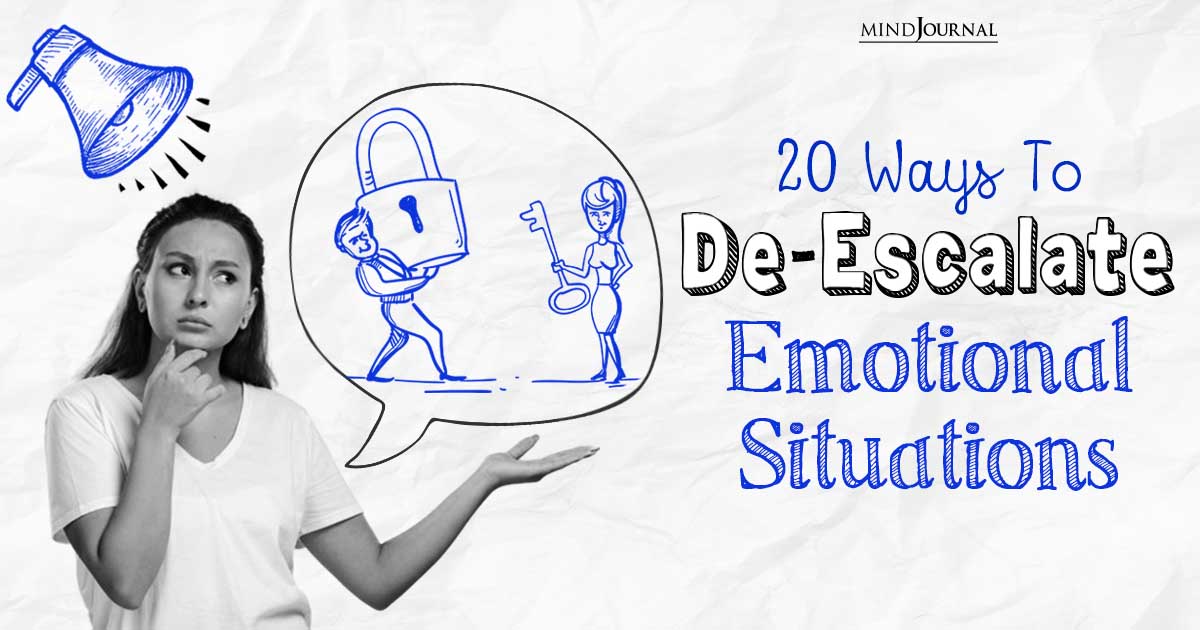Handling emotional situations can sometimes seem very tricky, which why is knowing how to de-escalate emotional situations is an underrated superpower to have. This article is going to provide some of the best tips for de-escalating sensitive situations.
KEY POINTS
- Observation is key to de-escalating and maintaining social harmony.
- Body language to convey calmness and empathy is crucial during emotional turmoil.
- What you say matters, but what you do matters even more.
Co-authored by Joe Navarro and Anne-Maartje Oud
At home or at work, inevitably, we will all be confronted with situations in which emotions begin to get out of control. Sometimes it is a clash of ideas, miscommunication, or pent-up feelings that percolate to the surface because of a perceived wrong or dissatisfaction.
Whatever the cause, we want to bring those negative emotions under control as quickly as possible before they escalate.
Over the years, we have been consulted on how to defuse emotional situations in various settings and circumstances—everything from individuals who won’t talk to each other, or who are reacting angrily, to pushing and shoving, throwing objects, and, in one case, even assault.
Learning to de-escalate is a little bit of art, science, and social diplomacy, and it begins with you. We say that because we cannot assume the other person will seek to do so; nor can we assume they have the skill set and the will to do so.
De-escalation begins as a mental process, where social cues as well as verbal and nonverbal communications are deployed to keep emotional situations from getting out of control. It also requires determination to see it through, knowing it may take some time to ameliorate the situation to keep it from escalating.
Here are 20 tips for de-escalating at home or at work we have found most useful. Every situation is unique, so ensure that you align your behavior with what is needed in your specific circumstances.
Related: How To Calm Down Quickly? 5 Best Tried And Tested Self-Calming Methods
20 Ways To De-Escalate Emotional Situations
1. Stay calm.
Take deep breaths and try to stay centered, aware, but, above all, calm. This may sound easy, but, where emotions are concerned, this may be difficult.
I once confronted an angry man with a knife in hand; it took everything I had to remain calm in the face of a threat. By remaining calm, we can influence nonverbally what others perceive and how they will react.
2. Use your body as a medium for expressing calm.
Lower your tone of voice, use palm-up gestures, relax the shoulders, angle your body slightly, create spatial distance, relax the face, and even try smiling, if appropriate; use your eyes to communicate that you don’t want to antagonize.

3. If they are speaking, listen carefully to what they say, the words that they use, what they repeat, but especially what they say first.
Words have meaning, and the primacy of words even more. No matter how illogical or emotional, listen and acknowledge that you are receiving their message. That does not mean you agree. In listening, we begin the important process of validation.
4. Validation is so invaluable when it comes to the de-escalation of emotions.
It lets others know that what they have to say matters, that you are listening, that you are empathetic. You may not agree with them, but validation is not agreement, it is recognition.
All humans want to be recognized and validated from the time we are toddlers. To effectively validate others, summarize what they said using their words, if possible. Click here for more information on validation.
5. Ask open-ended questions and show genuine interest in the other person’s experiences and perspectives…
and, in doing so, try to put yourself in their shoes. Be empathetic. Something has brought them to this point; perhaps it has built up over time; perhaps no one has taken the time to listen to them before; perhaps they are having psychological issues.
Whatever the case, be empathetic. “I’m so sorry to hear that, This must have been awful,” might help.
Related: 5 Ways To Stay Calm During An Argument With Your Spouse
6. Don’t sit in judgment.
That is not your role. Don’t tell people they should not feel that way or that they are wrong or that what they are saying has no merit. Get them to talk and vent; that is the most important thing you can do.
7. Hard as it is sometimes, check your ego at the door.
There is no battle to be won here. It is about returning to a state of emotional harmony—that is the objective, not being right. Words matter, and your words in those precious key moments will be long remembered.
In the Netherlands, there is a slogan that says, “Are you winning an argument or losing a relationship?,” wise words for all of us in a polarized environment.
Don’t shroud your own aggression by getting a dig in. What is called microaggression can derail the best of efforts. Suspend your own angst or even animosity for the sake of achieving emotional equanimity.
8. In dealing with co-workers, remember that these are people you must work with every day and perhaps for years to come.
Think long-term harmony. That mindset can help you to see how this is a process that will have long-term benefits. This is especially relevant at home.
9. In silence, acknowledge with your eyes…
through arched eyebrows, or by tilting your head, or nodding, that you are listening and attentive. A genuine smile, where and when appropriate, can also help put people at ease and create a positive atmosphere.

10. Avoid crossing your arms or legs, as this can create the illusion of a barrier between you and the other person.
Instead, try to adopt an open, relaxed posture. When negative emotions are at play, these behaviors can be misperceived, so avoid them.
11. If the other person is feeling anxious or uncomfortable, offer reassurance and support.
Let them know that you are there to help and that you care about their well-being. When someone is crying or in shock, you might feel inclined to leave to avoid your own discomfort and to give them space.
However, it’s important not to do so. Instead, make sure you stay in the room with them. You can verbalize your support by saying, “I’m here if you need me.”
Related: 10 Surprising Habits Of Calm People That You Need To Learn
12. Be mindful of the other person’s personal space…
and their personal property (purse, desk, backpack, possessions), and avoid getting too close. It’s always safer to have greater distance.
13. If the person is a stranger, ask them their name, if possible.
Use an honorific if it applies, such as “Professor” or “Doctor.”
14. Don’t feel you have to stay in one place.
Sometimes between colleagues going for a walk, sitting outside, or sitting side by side on a bench rather than across from each other helps to relieve tension.
15. If the situation is escalating and emotions are running high, consider taking a break.
There is nothing wrong with saying: “I need to step out. I will be back, but I need to think about what has been said.” Let the other party know you want to engage, but you are human also and may need to consider what has transpired thus far.
This can help both parties to calm down and approach the situation more rationally.
16. Use positive language to create a more positive environment.
For example, instead of saying “I can’t help you with that,” say “Let me see what I can do to help.”
17. Look for areas of agreement or shared interests.
This can help to build rapport and create a more positive interaction.
18. If possible, suggest a solution that can help to resolve the issue at hand or viable options.
This can demonstrate that you’re willing to work together to find a positive outcome. The most important thing, even while you are finding a solution, say you are using a laptop, is don’t go silent. Keep others informed. Give them updates.
19. If a weapon is brandished—any kind—distance is your best help.
Even if they have a knife or a gun, stay calm, use your voice, create further distance, and work on all the traits of de-escalation discussed. Where possible, seek help.
Related: 11 Daily Zen Habits That Will Transform Your Life
20. Don’t forget to reward individuals who begin to de-escalate by relaxing even further.
By further validation, by thanking them for considering solutions you may have proposed, by showing greater comfort around them.
Conclusion: De-escalation takes a desire and commitment to make things better. With some of the tips here and where possible some practice, it can be achieved with a little patience. Lastly, if you forget everything else, remain calm and empathetic as you seek to resolve the situation in a constructive manner.
Copyright © 2023 Joe Navarro and Anne-Maartje Oud.
Anne-Maartje Oud is the founder and director of The Behaviour Company, a worldwide consultancy on best practices and human behavior.
Written By Joe Navarro
Originally Appeared On Psychology Today









Leave a Reply